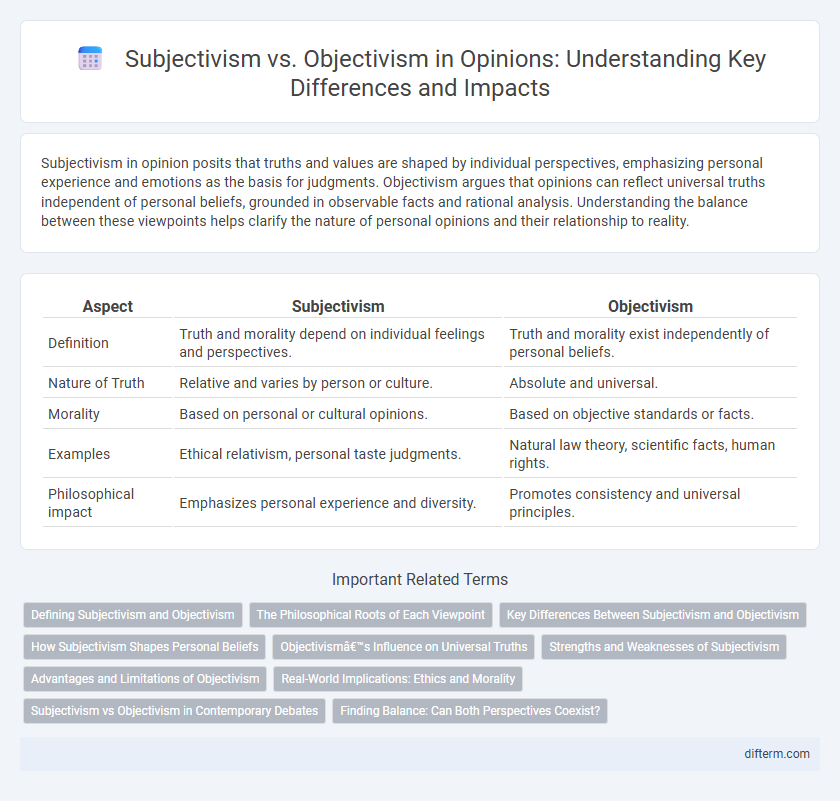Subjectivism in opinion posits that truths and values are shaped by individual perspectives, emphasizing personal experience and emotions as the basis for judgments. Objectivism argues that opinions can reflect universal truths independent of personal beliefs, grounded in observable facts and rational analysis. Understanding the balance between these viewpoints helps clarify the nature of personal opinions and their relationship to reality.
Table of Comparison
| Aspect | Subjectivism | Objectivism |
|---|---|---|
| Definition | Truth and morality depend on individual feelings and perspectives. | Truth and morality exist independently of personal beliefs. |
| Nature of Truth | Relative and varies by person or culture. | Absolute and universal. |
| Morality | Based on personal or cultural opinions. | Based on objective standards or facts. |
| Examples | Ethical relativism, personal taste judgments. | Natural law theory, scientific facts, human rights. |
| Philosophical impact | Emphasizes personal experience and diversity. | Promotes consistency and universal principles. |
Defining Subjectivism and Objectivism
Subjectivism posits that knowledge and truth are contingent on individual perceptions and emotions, emphasizing personal experience as the basis of understanding reality. Objectivism asserts that reality exists independently of consciousness, with truths discoverable through reason and empirical evidence. These contrasting philosophies highlight the tension between internal interpretation and external verification in defining what is real or true.
The Philosophical Roots of Each Viewpoint
Subjectivism traces its roots to Enlightenment thinkers such as David Hume, emphasizing individual perception and the belief that knowledge is inherently shaped by personal experience. Objectivism, influenced by Aristotle and later Ayn Rand, asserts that reality exists independently of consciousness and that truths can be discovered through reason and empirical observation. These philosophical foundations highlight the core divide between interpreting knowledge as internally constructed versus externally determined.
Key Differences Between Subjectivism and Objectivism
Subjectivism asserts that truth and morality depend on individual perceptions and feelings, emphasizing personal experience as the basis for judgment, while objectivism maintains that truth and ethical principles exist independently of human thoughts or emotions. In subjectivism, reality is inherently fluid and variable, reflecting diverse viewpoints, whereas objectivism insists on universal, fixed facts and standards accessible through reason and empirical evidence. The key difference lies in subjectivism's reliance on personal context versus objectivism's emphasis on objective reality and consistency across all observers.
How Subjectivism Shapes Personal Beliefs
Subjectivism shapes personal beliefs by emphasizing individual experiences and emotions as the basis for truth, allowing diverse perspectives to coexist without a universal standard. This approach fosters a deeply personal understanding of reality, where meanings and values are fluid and context-dependent. Consequently, subjectivism empowers people to construct unique worldviews that reflect their own inner perceptions rather than external facts.
Objectivism’s Influence on Universal Truths
Objectivism asserts that universal truths exist independently of individual beliefs, grounding knowledge in objective reality and rationality. This philosophy influences disciplines such as science and ethics by promoting the idea that certain truths are absolute and discoverable through reason. Emphasizing objective standards challenges relativistic views, reinforcing a consistent framework for understanding reality and morality.
Strengths and Weaknesses of Subjectivism
Subjectivism empowers individuals by validating personal experiences and emotions as sources of truth, promoting diverse perspectives and empathy in ethical decision-making. However, its reliance on personal viewpoints often leads to inconsistencies and difficulties in resolving conflicts due to the lack of universal standards. This approach can also undermine objective analysis in fields requiring empirical evidence and shared criteria for truth.
Advantages and Limitations of Objectivism
Objectivism offers clear criteria for truth and knowledge, enabling consistent decision-making and ethical standards based on observable reality. Its emphasis on objective facts promotes fair assessments, reducing bias that often arises in subjective interpretations. However, strict adherence to objectivism may overlook individual experiences and emotional nuances, limiting its ability to fully capture the complexity of human perspectives.
Real-World Implications: Ethics and Morality
Subjectivism treats ethics as individual preferences, resulting in varied moral judgments that can hinder consensus on social policies and justice. Objectivism posits universal moral truths, providing a stable framework for laws and human rights that guide consistent ethical behavior. The real-world impact shows subjectivism's flexibility clashes with objectivism's clarity, influencing debates on cultural relativism and global ethical standards.
Subjectivism vs Objectivism in Contemporary Debates
Subjectivism in contemporary debates emphasizes the primacy of individual perspectives and personal experiences in determining truth and value, contrasting sharply with objectivism's assertion of universal principles independent of human perception. This dichotomy influences ethical discourse, where subjectivism supports moral relativism, arguing that moral judgments are contingent on cultural or personal contexts, while objectivism defends absolute moral standards discoverable through reason. The ongoing contention highlights challenges in reconciling pluralistic societies with the need for shared frameworks in law, politics, and human rights.
Finding Balance: Can Both Perspectives Coexist?
Subjectivism emphasizes individual experience and personal truth, while objectivism relies on universal facts and external reality, creating a dynamic tension between perspective and evidence. Finding balance requires recognizing that subjective experiences shape interpretation, but objective data grounds understanding, allowing for a comprehensive worldview. This coexistence fosters nuanced decision-making, where personal values align with factual integrity.
subjectivism vs objectivism Infographic

 difterm.com
difterm.com